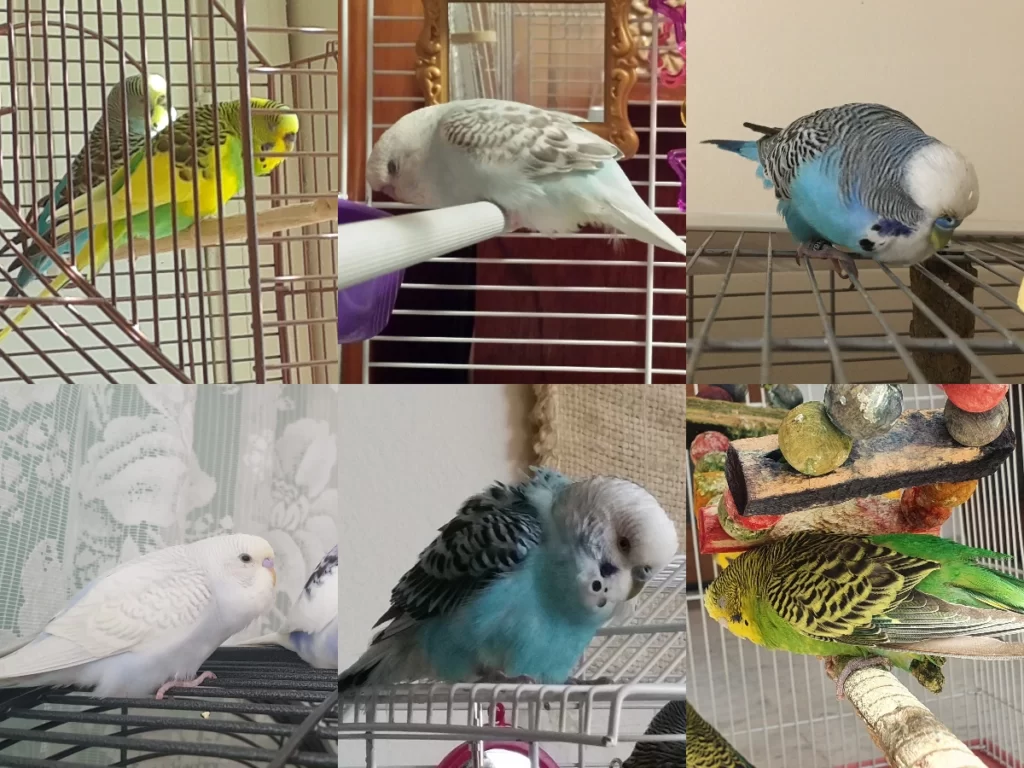Budgies might hunch over due to various reasons. Common causes include illness or disease, old age and arthritis, and malnutrition.
Additionally, stress and fear, cold temperatures, sleep deprivation, breeding behavior, and injury could be factors.
Lastly, rare diseases or genetic disorders may cause this posture.
Are you a bird lover wondering why your budgie is hunched over? As a former budgie owner, I’ve seen this before and have gathered from my experiences that there are nine reasons for this behavior.
It could be due to age, illness, stress, or even breeding behavior. Let’s delve into these reasons to better understand our feathered friends.

1. Illness or Disease
Budgies, like many other creatures, are not immune to sickness. In fact, their illnesses often manifest physically.
One such manifestation could be a hunched over posture. This can be a telling symptom of a variety of ailments.
For instance, Psittacosis, a bacterial infection, may cause your budgie to hunch over. It’s important to watch out for other symptoms such as discharge from the eyes or beak, and changes in droppings.
Avian Gastric Yeast (AGY) infection is another potential culprit. The symptoms of this infection, apart from hunching over, include regurgitation, weight loss, and unusual feces.
There’s also Avian influenza, commonly known as bird flu, which can manifest in a variety of symptoms including respiratory distress and depression, in addition to a hunched over stance.
Lastly, a common issue in birds are respiratory illnesses. These could result from a variety of bacteria, viruses, or fungi, and may cause your budgie to hunch over while also exhibiting symptoms like tail bobbing, sneezing, and difficulty breathing.
2. Old Age and Arthritis
As budgies grow older, they may start to show signs of arthritis. Just like in humans, this condition can lead to joint pain and inflammation, which could cause your budgie to adopt a hunched posture.
Other signs of arthritis in budgies could be a decrease in activity levels, a reluctance to use a particular limb, or a general discomfort when moving.
The impact of arthritis on a budgie’s posture can be quite noticeable. Your budgie may choose to sit in one place more often, or struggle with normal activities like climbing or flying.
Creating a comfortable environment for an arthritic budgie is essential. This could involve rearranging their cage to minimize the need for climbing, or providing softer perches.
3. Malnutrition
Just like us, budgies require proper nutrition to lead healthy and fulfilling lives. Malnutrition can lead to a hunched over posture and other health problems.
Essential nutrients for budgies include a balanced mix of seeds, fruits, vegetables, and bird-safe grains.
Proteins, fats, vitamins, and minerals are all crucial for their wellbeing.
If you notice signs of malnutrition in your budgie such as dull feathers, lethargy, or weight loss, it’s critical to reassess their diet.
These symptoms, together with a hunched over stance, could indicate that your budgie is not receiving the nutrients it needs.
Malnutrition impacts not only a budgie’s posture but their overall health as well. It can lead to a weakened immune system, making them more susceptible to illnesses.
4. Stress and Fear
Budgies, being sensitive creatures, can experience stress and fear. This emotional discomfort can lead them to exhibit a hunched posture.
Various factors can cause stress in budgies. These could include a change in their environment, the presence of predators, or even loneliness.
It’s important to remember that budgies are social creatures and require companionship and mental stimulation.
The impact of stress on a budgie’s body language is noticeable. Apart from hunching over, they may also exhibit behaviors such as feather plucking, decreased appetite, and aggressive or withdrawn behavior.
5. Cold Temperature
Budgies can become uncomfortable and even distressed in cold temperatures, leading to them adopting a hunched over posture.
Budgies are native to Australia and are accustomed to warmer climates. When exposed to colder temperatures, they may hunch over in an attempt to retain heat.
Maintaining an appropriate temperature for your budgie is crucial for their comfort and wellbeing. The ideal temperature range for budgies is between 65 and 75 degrees Fahrenheit (18 to 24 degrees Celsius).
Be sure to keep their cage away from drafts and provide them with a cover for their cage during colder nights.
6. Sleep Deprivation
Sleep plays an integral role in the health of a budgie. Lack of adequate sleep can lead to a hunched over posture and other health issues.
A budgie typically requires about 10-12 hours of sleep per night. This sleep is crucial for their cognitive function, mood, and physical health.
It’s a time when their bodies can heal and regenerate.
Signs of sleep deprivation in budgies can include irritability, decreased appetite, and a noticeable change in posture, such as hunching over.
7. Breeding Behavior
At times, a hunched over posture can be part of a budgie’s breeding behavior.
Typical budgie breeding behaviors can include fluffed feathers, specific vocalizations, and an increased appetite. Hunching can be a sign of readiness for mating.
However, it’s important to differentiate between normal breeding behavior and potential health issues. If the hunching is accompanied by other concerning signs such as lethargy, loss of appetite, or other changes in behavior, it’s advisable to consult with a veterinarian.
8. Injury
Injuries can cause a budgie to adopt a hunched over posture.
Common budgie injuries include wing injuries, leg injuries, and internal injuries from falls or collisions.
If your budgie starts to hunch over suddenly, this might be a sign of injury.
Identifying injuries involves carefully observing your budgie’s behavior and physical condition.
9. Less Common Causes
Finally, there can be less common causes for a budgie to hunch over. These can include rare diseases and genetic disorders.
Conditions such as kidney disease, liver disease, or genetic disorders can cause discomfort leading to a hunched posture.
Though these are less common, it’s important to be aware of them.
If a hunched posture persists and no other cause can be determined, it’s advisable to consult a vet for a thorough examination.
They can conduct tests to determine if the issue is due to a less common disease or disorder.
Faqs
What Other Symptoms Might Accompany a Hunched Over Budgie?
Depending on the cause, a hunched over budgie might exhibit additional symptoms. For instance, if it’s ill, it may show signs of lethargy, loss of appetite, or irregular breathing.
In case of stress, the budgie could become unusually quiet or start over-preening.
How Can I Help My Budgie if It’s Hunching Over Due to Old Age or Arthritis?
For older budgies or those suffering from arthritis, providing a comfortable and easily accessible environment is crucial.
This can involve using lower perches and ensuring their food and water containers are easily reachable.
Pain management under the supervision of a vet may also be necessary.
What Kind of Diet Helps Prevent Malnutrition in Budgies?
A balanced diet for budgies should include a mix of high-quality birdseed or pellets, fresh fruits and vegetables, and an occasional serving of hard-boiled eggs for protein.
Regularly rotating food types can help prevent malnutrition and keep your budgie healthy.
What Should I Do If I Suspect My Budgie Is Injured?
If you suspect your budgie is injured, it’s best to consult a vet immediately. They can provide a proper examination and treatment.
In the meantime, minimize handling to avoid aggravating the injury, and keep the bird in a quiet, comfortable environment.


